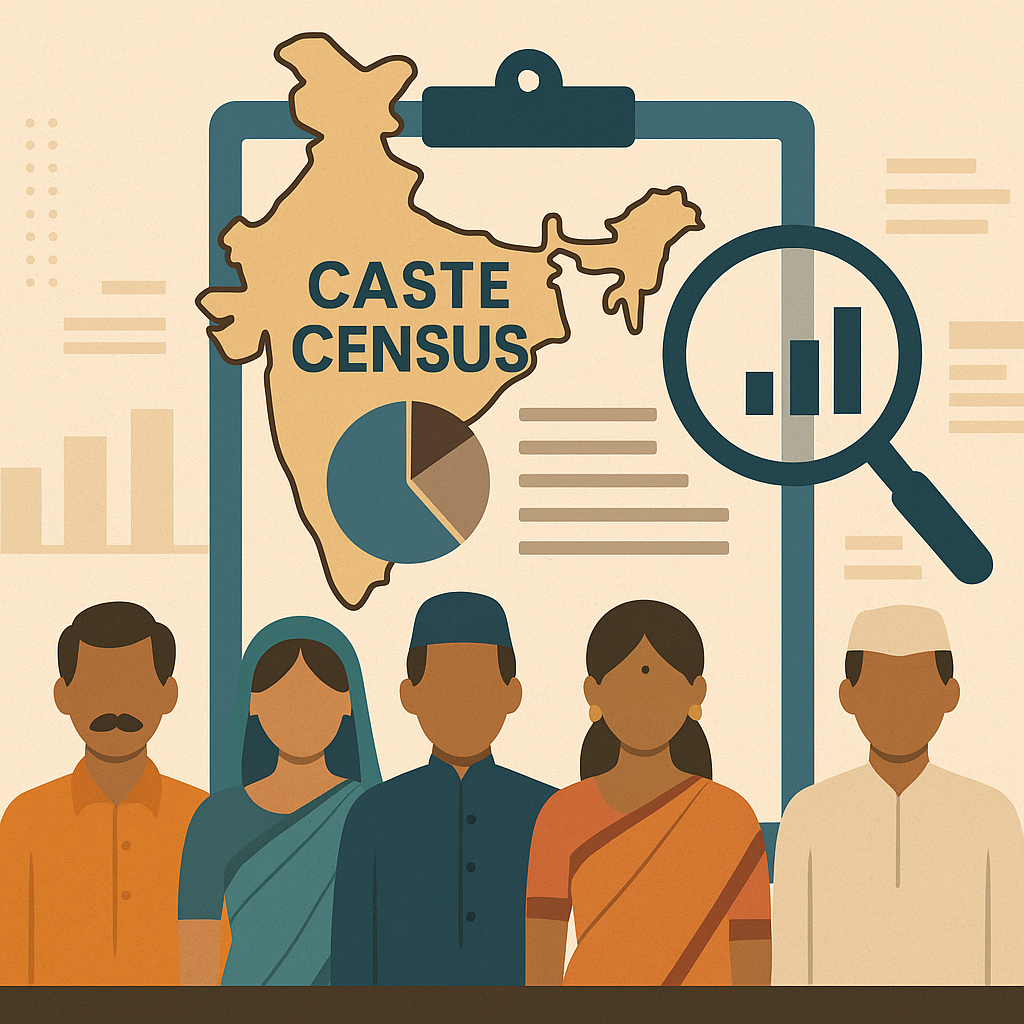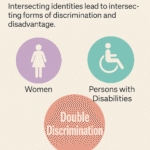1. Introduction
The demand for a caste census has re-emerged as a central issue in Indian politics and public policy, particularly after Bihar’s 2023 caste survey and the Union Government’s approval of caste enumeration in the upcoming national census. While caste enumeration was a regular feature until 1931, its exclusion in later decades reflects India’s uneasy relationship with caste as both a social and political construct.
This article critically examines the historical evolution, political context, and policy implications of caste-based data collection, with special attention to Bihar’s recent survey. It argues that a national caste census is indispensable for evidence-based affirmative action, addressing historical injustices, and enhancing democratic legitimacy in India.
2. Caste as a Persistent Social Reality
Caste continues to structure access to resources, upward mobility, and representation in India. Despite constitutional commitments to equality, caste-based disparities remain entrenched. A national caste census, absent since 1931, is a crucial tool to document and dismantle these inequalities through data-informed policy interventions.
3. Historical Background of Caste Enumeration in India
From 1871 to 1931, the British colonial government conducted caste-based censuses to understand and control Indian society. The 1931 Census was the last to record detailed caste data, and its numbers still underpin reservation policies today.
Post-Independence, caste enumeration was limited to Scheduled Castes (SCs) and Scheduled Tribes (STs), omitting Other Backward Classes (OBCs) and General categories. The goal was to de-emphasize caste, but this approach ignored persistent social hierarchies, prompting renewed demands for comprehensive data.
4. Bihar’s 2023 Caste Survey: A Political Turning Point
In 2023, Bihar’s government, led by Nitish Kumar and supported by the RJD, launched a caste survey that revealed OBCs and EBCs constitute over 63% of the state’s population. This strengthened the push for increased reservations and proportional representation.
RJD leader Tejashwi Yadav called for 65% job reservations, positioning the survey as a tool for social justice. Public demonstrations and political statements highlighted the growing demand for caste-based policy reform.
5. National Politics and Changing Party Narratives
Caste census has become a national issue, influencing electoral strategies. While the NDA (BJP and JD(U)) now supports the census, the Opposition (RJD, Congress) claims credit for reviving the issue.
BJP leaders, previously cautious about caste politics, are now seeking OBC and EBC support. Statements by BJP leaders like Santosh Pathak reflect a tactical shift, as they attempt to neutralize the Opposition’s social justice narrative.
6. Legal and Constitutional Dimensions
Any policy changes based on caste data, such as expanding reservations, face constitutional constraints. The Supreme Court’s 1992 Indra Sawhney judgment capped reservations at 50%. Bihar’s 65% quota attempt was struck down, prompting RJD leaders to suggest placing such measures in the Ninth Schedule to shield them from judicial review.
This raises critical constitutional questions about the limits of affirmative action and the balance between social justice and legal safeguards.
7. Why Caste Data Matters
a. Policy Formulation and Social Equity
Accurate data enables targeted welfare schemes, ensures efficient resource allocation, and prevents policy distortions, such as inclusion of the “creamy layer.”
b. Correcting Historical Injustice
A caste census is vital for recognizing and quantifying systemic marginalization, which is a prerequisite for meaningful reform in education, employment, and representation.
c. Strengthening Democratic Legitimacy
Representation in a democracy should reflect population realities. Caste data will reveal underrepresentation in politics, administration, and academia, creating pressure for inclusive governance.
8. Challenges and Concerns
a. Risk of Social Fragmentation
Critics argue that caste enumeration might reinforce identity politics and deepen divisions, especially in a multi-ethnic democracy like India.
b. Data Complexity and Accuracy
With thousands of sub-castes and potential self-reporting issues, ensuring data quality is a major concern. The 2011 SECC faced similar challenges and was never fully released.
c. Political Manipulation
Without safeguards, caste data may be used for vote-bank politics rather than genuine reform. There is a pressing need for transparent data usage frameworks.
9. Conclusion: Toward a Just and Inclusive India
The caste census debate reveals a larger ideological struggle between two visions of India: one that ignores caste in the hope of national unity, and another that recognizes caste to redress deep-seated inequalities.
Bihar’s 2023 survey has catalyzed national conversations. If the process is transparent, scientifically rigorous, and legally supported, a caste census could be transformative. The next step is to ensure that this data leads to legislative action, public dialogue, and policy reform grounded in the constitutional values of justice, equality, and dignity.
📚 References
- Government of India. Census Reports (1871–1931).
- Indra Sawhney & Others v. Union of India, AIR 1993 SC 477.
- Hasan, Zoya. Politics of Inclusion: Castes, Minorities and Affirmative Action. Oxford University Press, 2009.
- Jaffrelot, Christophe. India’s Silent Revolution. Hurst & Co., 2003.
- Alborn, Timothy L. “Age and Empire in the Indian Census, 1871–1931.” Journal of Interdisciplinary History 30, no. 1 (1999): 61–89.
- Tiwary, Deeptiman. “Caste Census Amidst Bihar Polls…” The Indian Express, May 3, 2025.
- Sukumar, N. “Caste Census Will Help Us Realise Inequality…” The Indian Express, May 1, 2025.
- Sharma, Sandipan. “The Politics of Caste Census…” India Today, May 1, 2025.
- Jerath, Arati R. “Caste Census: Can BJP Navigate Mandal 3.0?” NDTV, May 2, 2025.
✍️ About the Author
Dr. Md Altamash Imam is a distinguished Assistant Professor of Political Science at Sikkim Alpine University. Widely respected for his intellectual depth and clarity, Dr. Imam has established himself as a leading voice in the study of caste, reservation policy, and democratic representation in India. His research offers critical insights into the intersections of identity, governance, and social justice, particularly in the context of India’s complex affirmative action framework.
Dr. Imam is known for his ability to bridge academic scholarship with ground-level realities. His writings are not only well-cited in academic circles but also resonate with policymakers and civil society actors striving for equitable reforms. A passionate educator and an articulate commentator, he continues to mentor students and researchers committed to building a more inclusive and evidence-based political discourse in India.



